Harris’ nomination locks in another Boomer presidency. This single generation — those born in the nineteen years between 1946 and 1964 — is guaranteed another presidency. 36 consecutive years, not counting the Biden Interregnum (he’s technically too old).
Despite being a Boomer, you may have noticed that she’s the young, exciting candidate.
Yes, the generational cutoff points are arbitrary, 19 is too many years to define a coherent generation. But the far more important fact is that Biden and Trump are really quite old. The echoes of the Baby Boom structure our political, economic and cultural reality. Our country’s age pyramid is just what our country is.
It is a crucial but oddly politically inert fact that at both the mass and elite level, our country is far older than it has ever been before. The macrodemographics are important enough, affecting everything from social spending to COVID policy to social unrest, as Janan Ganesh recently argued. But a macro level, US demographics are comparatively unremarkable, with places like Japan and Italy facing far steeper demographic cliffs.
It’s our electoral institutions cause the US to have such astronomically old leaders. The two-party system, lax campaign and especially campaign finance laws, and the primary system tilt the process heavily in favor of people with time, money and political interest — which, in our society, tends to be older people. Combine this with the Baby Boom and you get the current situation, playing out in slow motion, a demographic wave not crashing but seeping into and drowning our politics.
It’s telling that the only way our institutions avoided replicating their mistakes was by a catastrophic failure. How can a younger politician win a primary in this system? They can’t! Harris became the nominee not by winning the primary but by default.
A media-theoretic aside: television has demonstrated its continued dominance of the media ecosystem. The 2024 Biden-Trump debate is — without exaggeration — one of the most important media events in modern history. In direct contrast to the now-dated enthusiasm for the capacity of social media to generate collective action, it is the public knowledge function of television that effectively facilitates coordination.
The turnaround in support for Harris cannot be overstated. The vibe, immediately after the debate, was apocalyptic. “It can’t be Biden. But people hate Harris. It’ll be too hard to coordinate on someone else. What do we DO!?!”, to summarize the left-leaning pundits.
Now, Kamala is brat. So what happened? Was Harris just Obama 2.0 the whole time?
Let’s entertain the opposite hypothesis — that in fact, Obama was less unique than we remember. His overwhelming adoration among media/academic professionals requires that we grade his vibes on a curve — surely, this adoration caused us to overestimate his popularity overall. Obama was so popular because he was young, cool, and sexy. He won large margins because he was running against two men who were, respectively, old/kinda cool/unsexy and old/impossibly uncool/handsome but not my type.
But the same can be said of Bill Clinton! My guy was running against Bob Dole. Just for reference, here are the birth years for the major party candidates since 1992, with the age gap in bold:
- Clinton (1946) vs Bush (1924): 18
- Clinton (1946) vs Dole (1923): 19
- Bush (1946) vs Gore (1948): 2
- Bush (1946) vs Kerry (1943): 3
- Obama (1961) vs McCain (1936): 25
- Obama (1961) vs Romney (1947): 14
- Trump (1946) vs Clinton (1947): 1
- Trump (1946) vs Biden (1942): 4
- Trump (1946) vs Harris (1964): 18
Now if we simply plot the age gaps against the Electoral College margin of victory:
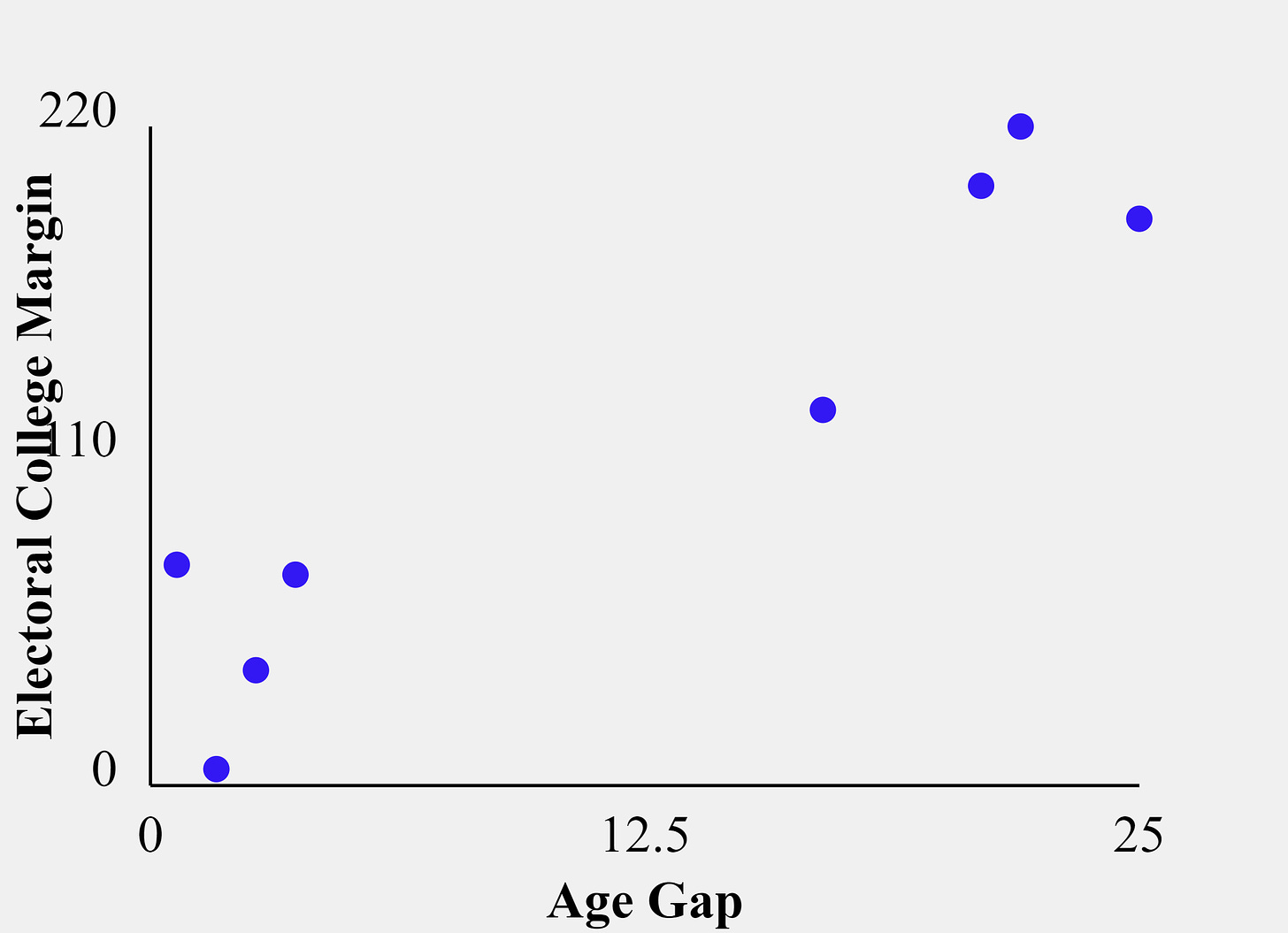
A pattern emerges. Small age gaps produce close races. Large age gaps produce landslides — and in each of those four elections, the younger candidate won big.
The data from hypothetical surveys are pretty conclusive: most people prefer younger politicians, young people especially like young politicians, but the biggest effect is a major preference against politicians who are over 75. The problem is on the supply side. This is the first election in twelve years in which voters will have the opportunity to chose between candidates of meaningfully different age.
Early evidence suggests a dramatic response:
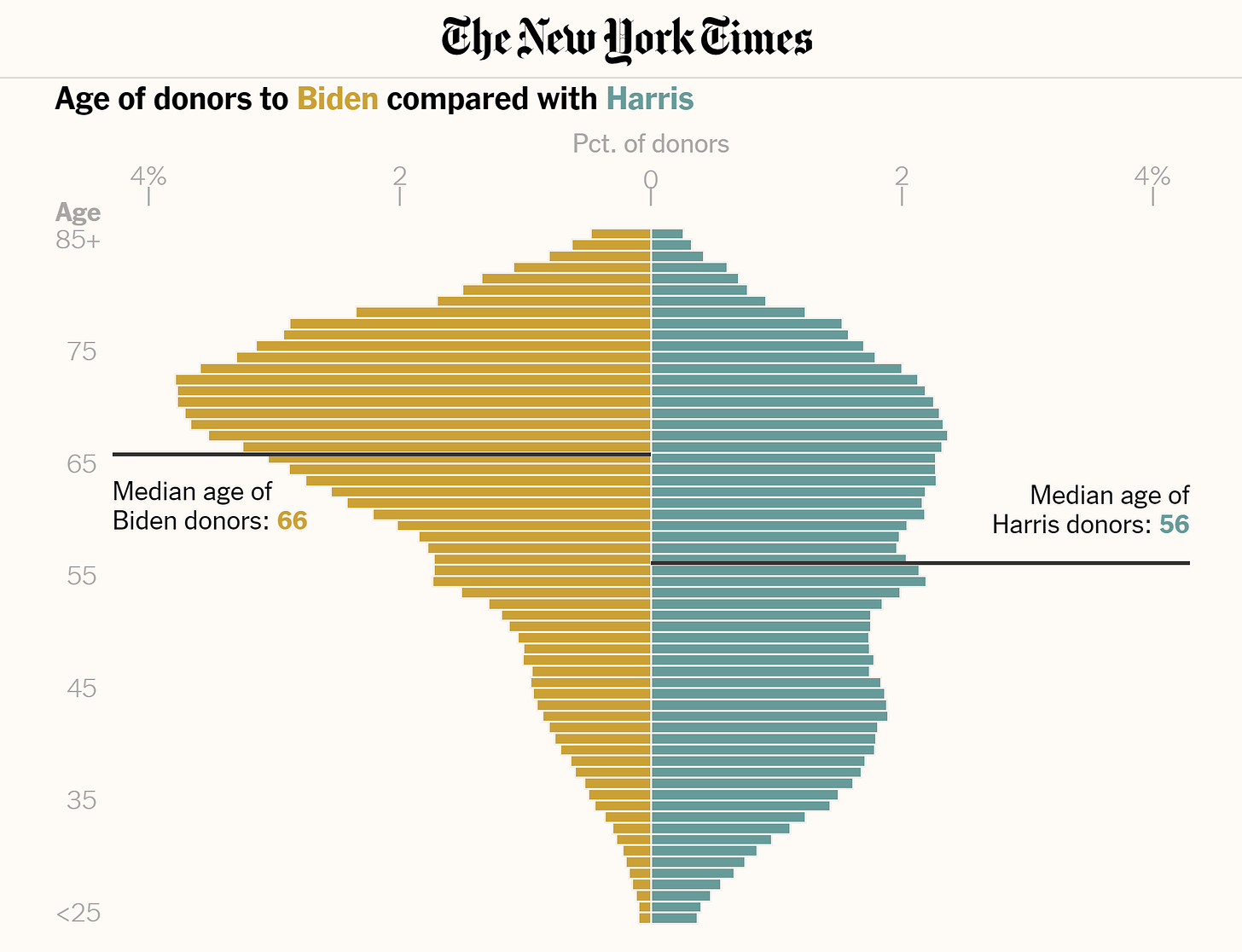
Talk about an age gap! The difference in medians actually understates the degree of difference. If we compare this graph against the overall age pyramid, we find that Harris’ distribution is remarkably similar to the population — and that Biden’s donors were heavily, heavily skewed older:
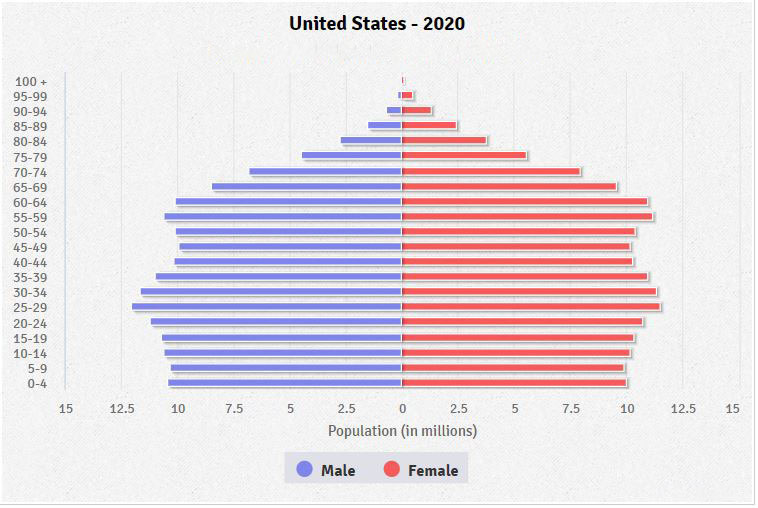
Running a younger candidate against an older one pays dividends for decades. Almost no one switches their partisan identification throughout their life course, so it really matters for parties to win over new generations. Over time, the inability to vote for younger politicians (like other important identity characteristics) produces cynicism, a democratic deficit. Running younger politicians is good for your party and good for democratic health.
On the Republican side, the Pew Research Center visualizes the situation on the Trump/Vance ticket.
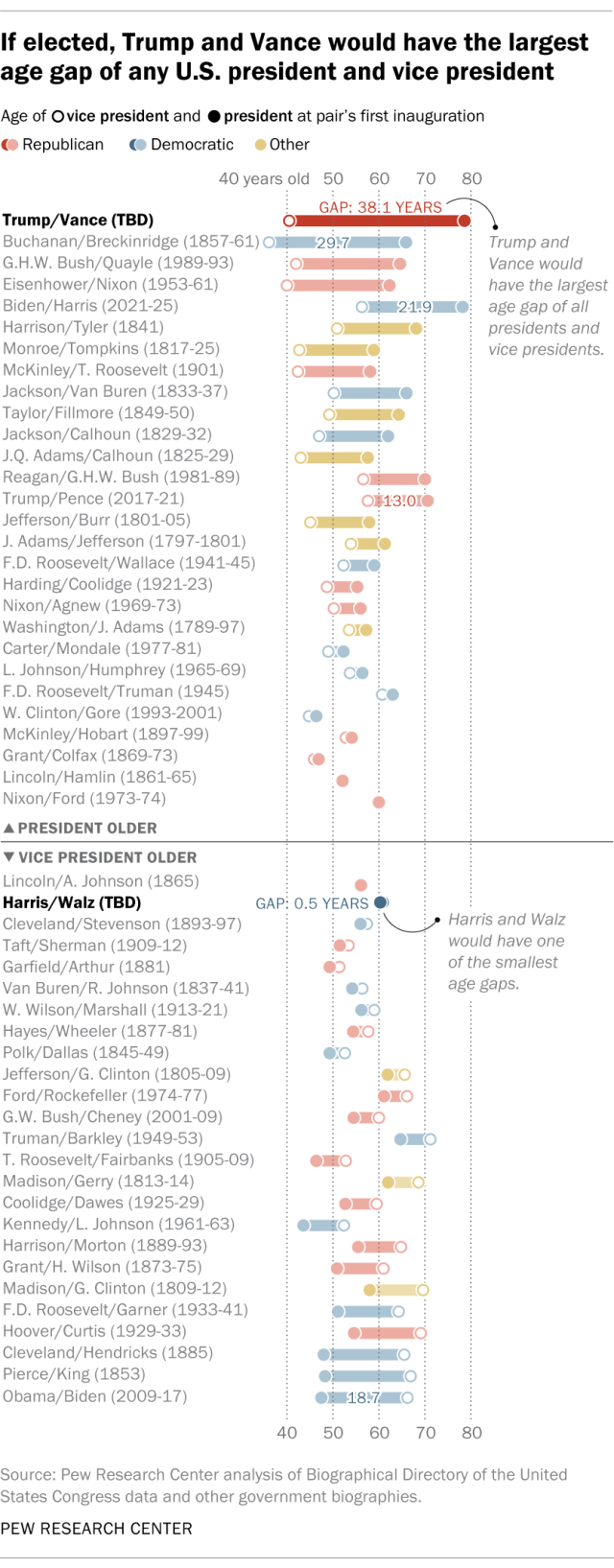
The overwhelming power of Boomer Ballast lends itself to these kind of generational swings. If Trump were to win, and then die, we would go from the second-oldest president to the youngest in history. And the problem is worse still.
Vance, if elected, would become the most powerful Millennial politician, a title currently held by Pete Buttigieg. These two men share the seemingly incongruous trait of being Millennials who are widely disliked by other members of their generation. Mayor Pete did terribly among young voters in the 2020 primary, and Vance…well, perhaps Millennial dislike for Vance follows directly from the universal dislike for Vance.
But the reason that Millennials dislike this men is precisely the same reason they have been able to rise through the ranks. It doesn’t matter what Millennials think — Vance and Buttigieg realize this, and have tailored their appeal to the Boomers in power. They have succeeded by acting “against type”: they are young people who act old. The same logic applies for the other demographic types — most of the first women to win office only overcame baseline misogyny by acting masculine.
More colorfully, Vance and Buttigieg are prime examples of what Max Read terms “Millennial Ambition Psychos.” There is of course a structural reason that the Millennials we see running for (vice) president share this characteristic: the total dominance of our institutions by Baby Boomers. The filter for younger generations is far harsher than it was before.
So the power of Boomer Ballast will persist even when Boomers themselves leave office. The first Millennial president will be
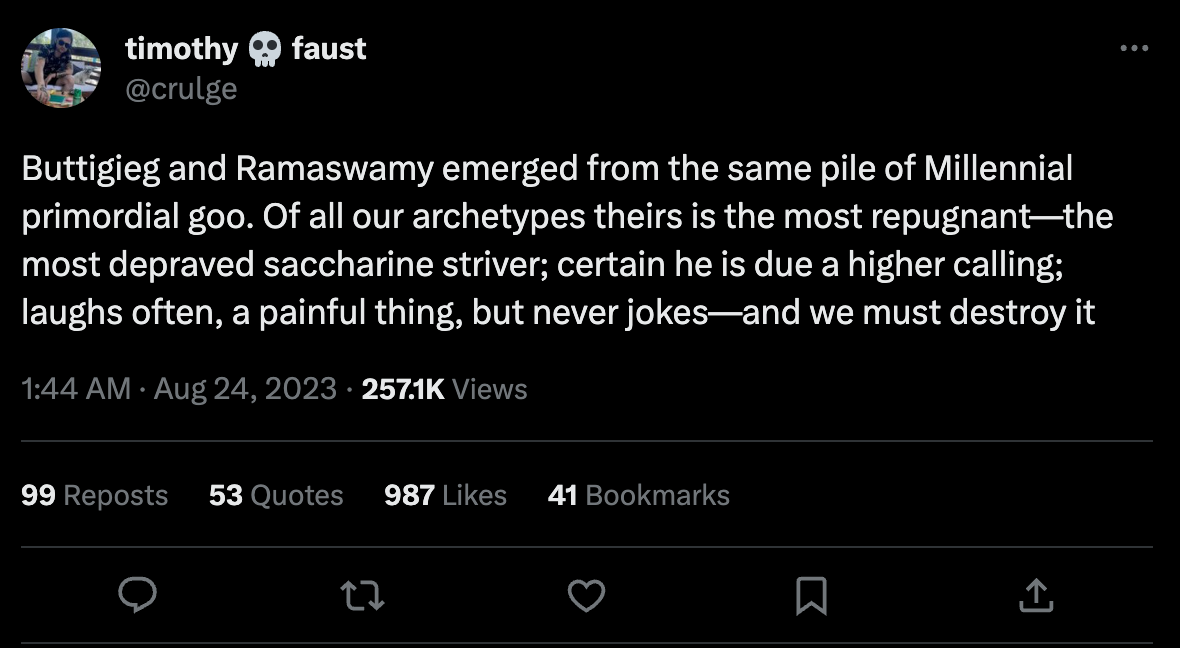
Millennials were, after all, originally called “Echo Boomers.”
The implicit prediction of this article is that Harris will win in a landslide. I don’t believe my 8-point scatter plot enough to go so hard against conventional wisdom. But so far, the evidence points to an unmet demand for younger politicians appealing to younger voters.
{ 21 comments }
Adam Hammond 08.28.24 at 12:00 pm
Echo Boomer sounds about right. This seems a lot like the kind of societal analysis that my boomer parents spent a ton of time on in the 70s, explaining why they should be in power. There is a group of people stuck between the ego bulges. It is quintessentially ‘boomer’ to suggest that, to set things right, they should jump into power.
some lurker 08.28.24 at 2:09 pm
No love Generation Jones? George Carlin’s epic rant against the boomers as selfish hypocrites and my own (born in 62) antipathy towards that cohort make me believe in it. They’re all arbitrary anyway.
stevem johnson 08.28.24 at 2:14 pm
Neither Peter Thiel nor Trump are boomers, so it’s unclear to me how Vance tailored his appeal to boomers. I think Vance’s rise is very much due to patronage from these non-boomers. It is also quite unclear to me how being an out gay man tailors an appeal to boomers.
Nor is it clear to me how you tailor an appeal to boomers by being an out gay man with a husband and two adopted children. Nor for that matter do I understand Secretary of Transportation to be very powerful, especially in contrast to a Senator.
Harry 08.28.24 at 3:04 pm
How does this compare with data for Governor and US Senator elections? (I’ve no idea, but I’d find it more convincing if they tallied).
And… do youngsters actually dislike Buttigieg? Sure, in the primary they flocked to two aged candidates who pandered to them, but that’s not evidence of dislike (I only say this because literally all the youngsters I know, who skew pretty left, immediately reached for his name when it started to look like the Dems were showing signs of wanting a candidate who might actually have a chance of winning. They are almost all, certainly, thrilled by Harris now she’s the candidate, but what they’re mainly thrilled by is that the Dems have decided not to concede the election before it even happened).
Sashas 08.28.24 at 4:14 pm
Seconding Harry (3) on both points.
I’ve never heard the terms “Millenial Ambition Psycho” or “Echo Boomer” before and neither seem remotely compelling to me. Buttigieg is a gunner. Gunners can be annoying, but they aren’t psychos.
I also think you’re giving the “left-leaning pundits” entirely too much credit. They are neither as in tune with the public, nor as left-leaning, as they would like us to believe.
qwerty 08.28.24 at 5:51 pm
Kamala Harris has beautiful teeth. People with beautiful teeth win in a landslide.
LFC 08.28.24 at 10:32 pm
My guess is that most well-established political systems favor, or are tilted toward, certain paths to leadership that tend to require fairly long periods of apprenticeship and rising through the ranks. It’s certainly not a hard-and-fast rule, but even as a “rule” with many exceptions it will tend to produce nominees/candidates for the highest offices who are well into middle age (or older). It doesn’t fit the case of Trump, of course, since he wasn’t a politician when he first ran in 2016 and hadn’t risen through the ranks of elective office.
Alex SL 08.28.24 at 10:34 pm
Interesting analysis. I had been wondering why the US political system seems exceptionally captured by very old politicians who absolutely refuse to have a succession plan, to a degree that one would otherwise only expect in a single party dictatorship.
One quibble, perhaps, with the post is that it remains pretty much stuck on aesthetics and their consequences for electoral success: nominating a candidate who is (or appears to be) young can increase one’s chances at victory. To me, the deeper problem, however, appears to be what it does to policy if politics are dominated by extremely old people, be it interest in funding free education or interest in keeping property prices low enough for young people to be able to afford one, or how serious the political class takes global crises that will reach truly catastrophic levels when the current members of that class are already deceased.
Harry 08.29.24 at 3:17 am
I’ve now read Read’s read on Buttigieg. I don’t know who Read is, but I guess I wasted less time reading it than he wasted writing it.
John Q 08.29.24 at 7:21 am
This is very US-specific. In Australia, politics has become a young(ish) person’s game, in which the players try to set themselves up for a lucrative post-politics career, typically finance-adjacent. For example, the head of the Australian Bankers Association went to that position directly from being leader of the “Socialist Left” faction of the Queensland Labor Party, in which capacity she became Premier of the state and sold off a bunch of public assets (explaining both her loss of the Premiership, since voters hated her, and her new, much more lucrative, job, since bankers loved her)
Gareth Richard Samuel Wilson 08.29.24 at 10:07 am
Normally, I’d argue that being only eight years old when conscription into the Vietnam War ended means you’re definitely in a different generation than the Boomers. But I guess that’s less convincing for a female politician.
Jacob Steel 08.29.24 at 11:16 am
I’m afraid I think that https://xkcd.com/1122/ very much applies here.
Kenny Easwaran 08.29.24 at 8:18 pm
It’s worth looking at the way presidential birth years have clustered over a longer period. (https://en.wikipedia.org/wiki/List_of_presidents_of_the_United_States_by_age)
For most of US history, there’s a president born every few years. The first big gap is a 13 year gap between the birth of Abraham Lincoln in 1809 and US Grant in 1822, and then another 13 year gap between the birth of William McKinley in 1843 and the birth of Woodrow Wilson in 1856. But the bigger gaps and clustering are in the 20th century.
There’s an 18 year gap between the birth of Eisenhower in 1890 and Johnson in 1908, with 7 presidents born in the next 16 years. Then there’s an 18 year gap between Carter in 1924 and Biden in 1942, with 4 presidents born in the next 4 years. Then there’s a 15 year gap between Bill Clinton in 1946 and Obama in 1961.
No one defines the generations precisely in the following way, but if we say the “Greatest Generation” is 1908-1924, the “Silent Generation” is 1925-1941, there’s a brief “War Baby Generation” in 1942-1946, followed by the “Boomers” in 1947-1960, with “Gen X” starting in 1961, then actually the Boomers and the Silent Generation are the only generations in American history that have never had a president from their era! It’s likely that the 1990s are the only decade with more births than the 1950s, and yet no one born in the 1950s will ever be President of the United States. (And given current political trends, I would not be surprised if the people born in the 1980s similarly overshadow the people born in the 1990s and prevent any of them from ever being president.)
Kenny Easwaran 08.29.24 at 8:25 pm
I don’t know if it undercuts or strengthens my previous observation (that the 1950s will be the first decade since the 1810s with no president born in it) to note that the 1950s are currently the most common birth decade both for Senators (40 or so https://fiscalnote.com/blog/how-old-118th-congress) and Governors (19 https://en.wikipedia.org/wiki/List_of_current_United_States_governors_by_age).
Timothy Sommers 08.29.24 at 8:59 pm
Interesting, but the polling that I can find suggests Pete Buttigieg is reasonably popular with millennials who identify as democrats – and is gaining in popularity. And, as you said, everyone hates Vance.
Benny Profane 08.29.24 at 9:22 pm
Vance is 39. Kennedy is 70, but looks 50 with his shirt off.
M 08.29.24 at 9:25 pm
Fwiw, the US Census Bureau uses a 1946-1964 timeframe for the Baby Boom, thus making Trump a Baby Boomer president, alongside Bill Clinton and George W. Bush (coincidentally, all born in 1946). If Kamala Harris (b. 1964) wins in November, she’d be the 4th Baby Boomer president.
JoeinCO 08.30.24 at 5:21 pm
Boomers must pass the torch to the younger generation: Millennials! (GenX here. Sighs.
If cynicism is not our defining characteristic then I don’t know what is). Nonetheless, Kamala has a more GenX vibe than any of the other Boomers cited and I’ll claim her for our lost generation.
Gareth Richard Samuel Wilson 08.30.24 at 8:45 pm
“It’s not that we don’t care
We just know that the fight ain’t fair”
The guy who wrote that was born in 1977, so Generation X actually has an appropriate slogan written by a member of Generation X.
J-D 08.31.24 at 4:29 am
It’s still astrology if you base it on year of birth rather than month of birth. I don’t believe in any kind of astrology.
I wonder what it’s like for other countries. India is notable for advanced ages of its Prime Ministers, but I don’t know what it’s like there at levels below that.
Rick 08.31.24 at 4:03 pm
Gen X technically started in April 1964. Harris was born in October 1964. She’s a Libra Scorpio cusp…one of the more powerful astrological combinations.
Comments on this entry are closed.